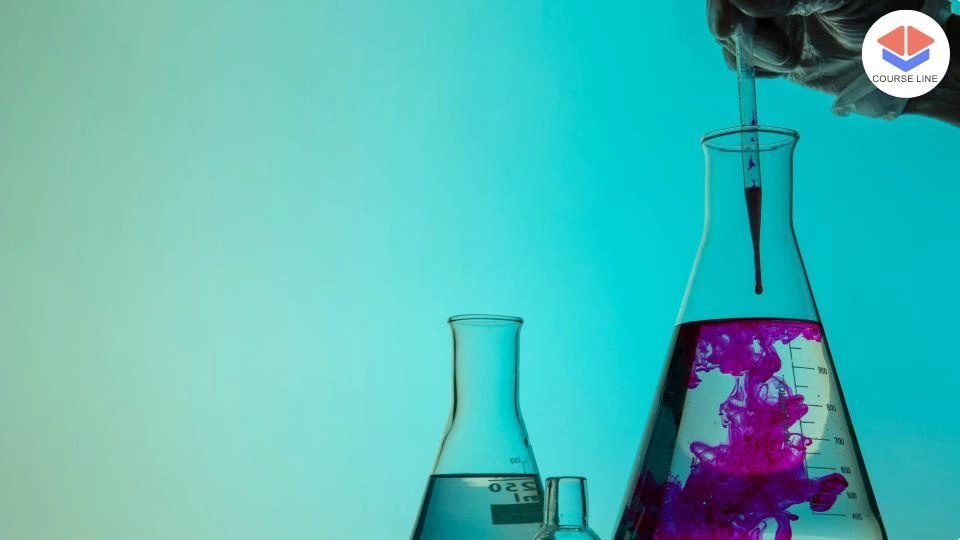Course Features
Price
Study Method
Online | Self-paced
Course Format
Reading Material - PDF, article
Duration
7 hours, 35 minutes
Qualification
No formal qualification
Certificate
At completion
Additional info
Coming soon
- Share
Overview
The Chemical Engineering Level 3 Advanced Diploma is a robust and practical course designed for learners who are passionate about chemistry, engineering, and solving real-world industrial challenges. This course provides essential knowledge across key chemical engineering topics, blending scientific principles with hands-on applications relevant to modern process industries, energy, pharmaceuticals, environmental engineering, and more.
The course begins with an introduction to the field of chemical engineering, examining its history, significance, and the core concepts that underpin it. Learners gain an understanding of how chemical engineers contribute to the development of new materials, clean energy solutions, and safe, sustainable production systems. Ethical considerations are also introduced to reinforce the responsibility that comes with engineering practice.
Thermodynamics and reaction engineering are central to chemical engineering, and this module explores energy balances, heat and mass transfer, reaction kinetics, and reactor design. Learners will also gain insight into catalysis and the role of catalysts in optimizing industrial chemical reactions, helping reduce energy use and improve yields.
The fluid mechanics and unit operations module provides foundational knowledge of how fluids behave and are manipulated in industrial processes. Topics include fluid flow, transport systems, mixing, and essential separation methods such as distillation, absorption, and extraction. Heat exchangers and process equipment design are also covered, offering a clear view of how unit operations function within larger systems.
Process control and instrumentation teaches learners how chemical processes are monitored and optimized. From control system basics and instrumentation types to PID controllers and safety systems, this module equips students with the tools needed to maintain process stability and performance. Troubleshooting and hazard analysis are emphasized to ensure safe, efficient operations.
In the chemical process design module, learners dive into flow diagrams, equipment sizing, plant layout, and economic evaluation. This knowledge supports the creation of efficient, scalable, and cost-effective chemical plants, with a focus on real-world applications and safety integration.
Environmental and sustainable engineering is also highlighted, introducing students to pollution control, green chemistry, life cycle assessment, and the role of renewable energy and biofuels in building a sustainable future. Learners will understand the importance of minimizing environmental impact and designing processes that support circular economies.
Process safety and risk management is another critical component of the course. Learners explore hazard identification, risk assessment, emergency preparedness, and compliance with industry standards to ensure a safety-first approach to all engineering activities.
Finally, the course wraps up with a focus on professional skills. Learners build competencies in communication, teamwork, project management, and career development. This module prepares students not only for technical success but also for leadership roles and long-term career progression in the chemical engineering sector.
By the end of the course, students will have a comprehensive understanding of core chemical engineering principles, along with the professional and ethical skills needed to thrive in a wide range of industries.
Graduates can explore career opportunities as Process Technicians, Chemical Engineering Assistants, Production Operators, Plant Support Engineers, or Technical Analysts. This diploma also supports further study toward degrees or higher diplomas in chemical, environmental, or process engineering.
Who is this course for?
The Chemical Engineering Level 3 Advanced Diploma is a robust and practical course designed for learners who are passionate about chemistry, engineering, and solving real-world industrial challenges. This course provides essential knowledge across key chemical engineering topics, blending scientific principles with hands-on applications relevant to modern process industries, energy, pharmaceuticals, environmental engineering, and more.
The course begins with an introduction to the field of chemical engineering, examining its history, significance, and the core concepts that underpin it. Learners gain an understanding of how chemical engineers contribute to the development of new materials, clean energy solutions, and safe, sustainable production systems. Ethical considerations are also introduced to reinforce the responsibility that comes with engineering practice.
Thermodynamics and reaction engineering are central to chemical engineering, and this module explores energy balances, heat and mass transfer, reaction kinetics, and reactor design. Learners will also gain insight into catalysis and the role of catalysts in optimizing industrial chemical reactions, helping reduce energy use and improve yields.
The fluid mechanics and unit operations module provides foundational knowledge of how fluids behave and are manipulated in industrial processes. Topics include fluid flow, transport systems, mixing, and essential separation methods such as distillation, absorption, and extraction. Heat exchangers and process equipment design are also covered, offering a clear view of how unit operations function within larger systems.
Process control and instrumentation teaches learners how chemical processes are monitored and optimized. From control system basics and instrumentation types to PID controllers and safety systems, this module equips students with the tools needed to maintain process stability and performance. Troubleshooting and hazard analysis are emphasized to ensure safe, efficient operations.
In the chemical process design module, learners dive into flow diagrams, equipment sizing, plant layout, and economic evaluation. This knowledge supports the creation of efficient, scalable, and cost-effective chemical plants, with a focus on real-world applications and safety integration.
Environmental and sustainable engineering is also highlighted, introducing students to pollution control, green chemistry, life cycle assessment, and the role of renewable energy and biofuels in building a sustainable future. Learners will understand the importance of minimizing environmental impact and designing processes that support circular economies.
Process safety and risk management is another critical component of the course. Learners explore hazard identification, risk assessment, emergency preparedness, and compliance with industry standards to ensure a safety-first approach to all engineering activities.
Finally, the course wraps up with a focus on professional skills. Learners build competencies in communication, teamwork, project management, and career development. This module prepares students not only for technical success but also for leadership roles and long-term career progression in the chemical engineering sector.
By the end of the course, students will have a comprehensive understanding of core chemical engineering principles, along with the professional and ethical skills needed to thrive in a wide range of industries.
Graduates can explore career opportunities as Process Technicians, Chemical Engineering Assistants, Production Operators, Plant Support Engineers, or Technical Analysts. This diploma also supports further study toward degrees or higher diplomas in chemical, environmental, or process engineering.
Requirements
The Chemical Engineering Level 3 Advanced Diploma is a robust and practical course designed for learners who are passionate about chemistry, engineering, and solving real-world industrial challenges. This course provides essential knowledge across key chemical engineering topics, blending scientific principles with hands-on applications relevant to modern process industries, energy, pharmaceuticals, environmental engineering, and more.
The course begins with an introduction to the field of chemical engineering, examining its history, significance, and the core concepts that underpin it. Learners gain an understanding of how chemical engineers contribute to the development of new materials, clean energy solutions, and safe, sustainable production systems. Ethical considerations are also introduced to reinforce the responsibility that comes with engineering practice.
Thermodynamics and reaction engineering are central to chemical engineering, and this module explores energy balances, heat and mass transfer, reaction kinetics, and reactor design. Learners will also gain insight into catalysis and the role of catalysts in optimizing industrial chemical reactions, helping reduce energy use and improve yields.
The fluid mechanics and unit operations module provides foundational knowledge of how fluids behave and are manipulated in industrial processes. Topics include fluid flow, transport systems, mixing, and essential separation methods such as distillation, absorption, and extraction. Heat exchangers and process equipment design are also covered, offering a clear view of how unit operations function within larger systems.
Process control and instrumentation teaches learners how chemical processes are monitored and optimized. From control system basics and instrumentation types to PID controllers and safety systems, this module equips students with the tools needed to maintain process stability and performance. Troubleshooting and hazard analysis are emphasized to ensure safe, efficient operations.
In the chemical process design module, learners dive into flow diagrams, equipment sizing, plant layout, and economic evaluation. This knowledge supports the creation of efficient, scalable, and cost-effective chemical plants, with a focus on real-world applications and safety integration.
Environmental and sustainable engineering is also highlighted, introducing students to pollution control, green chemistry, life cycle assessment, and the role of renewable energy and biofuels in building a sustainable future. Learners will understand the importance of minimizing environmental impact and designing processes that support circular economies.
Process safety and risk management is another critical component of the course. Learners explore hazard identification, risk assessment, emergency preparedness, and compliance with industry standards to ensure a safety-first approach to all engineering activities.
Finally, the course wraps up with a focus on professional skills. Learners build competencies in communication, teamwork, project management, and career development. This module prepares students not only for technical success but also for leadership roles and long-term career progression in the chemical engineering sector.
By the end of the course, students will have a comprehensive understanding of core chemical engineering principles, along with the professional and ethical skills needed to thrive in a wide range of industries.
Graduates can explore career opportunities as Process Technicians, Chemical Engineering Assistants, Production Operators, Plant Support Engineers, or Technical Analysts. This diploma also supports further study toward degrees or higher diplomas in chemical, environmental, or process engineering.
Career path
The Chemical Engineering Level 3 Advanced Diploma is a robust and practical course designed for learners who are passionate about chemistry, engineering, and solving real-world industrial challenges. This course provides essential knowledge across key chemical engineering topics, blending scientific principles with hands-on applications relevant to modern process industries, energy, pharmaceuticals, environmental engineering, and more.
The course begins with an introduction to the field of chemical engineering, examining its history, significance, and the core concepts that underpin it. Learners gain an understanding of how chemical engineers contribute to the development of new materials, clean energy solutions, and safe, sustainable production systems. Ethical considerations are also introduced to reinforce the responsibility that comes with engineering practice.
Thermodynamics and reaction engineering are central to chemical engineering, and this module explores energy balances, heat and mass transfer, reaction kinetics, and reactor design. Learners will also gain insight into catalysis and the role of catalysts in optimizing industrial chemical reactions, helping reduce energy use and improve yields.
The fluid mechanics and unit operations module provides foundational knowledge of how fluids behave and are manipulated in industrial processes. Topics include fluid flow, transport systems, mixing, and essential separation methods such as distillation, absorption, and extraction. Heat exchangers and process equipment design are also covered, offering a clear view of how unit operations function within larger systems.
Process control and instrumentation teaches learners how chemical processes are monitored and optimized. From control system basics and instrumentation types to PID controllers and safety systems, this module equips students with the tools needed to maintain process stability and performance. Troubleshooting and hazard analysis are emphasized to ensure safe, efficient operations.
In the chemical process design module, learners dive into flow diagrams, equipment sizing, plant layout, and economic evaluation. This knowledge supports the creation of efficient, scalable, and cost-effective chemical plants, with a focus on real-world applications and safety integration.
Environmental and sustainable engineering is also highlighted, introducing students to pollution control, green chemistry, life cycle assessment, and the role of renewable energy and biofuels in building a sustainable future. Learners will understand the importance of minimizing environmental impact and designing processes that support circular economies.
Process safety and risk management is another critical component of the course. Learners explore hazard identification, risk assessment, emergency preparedness, and compliance with industry standards to ensure a safety-first approach to all engineering activities.
Finally, the course wraps up with a focus on professional skills. Learners build competencies in communication, teamwork, project management, and career development. This module prepares students not only for technical success but also for leadership roles and long-term career progression in the chemical engineering sector.
By the end of the course, students will have a comprehensive understanding of core chemical engineering principles, along with the professional and ethical skills needed to thrive in a wide range of industries.
Graduates can explore career opportunities as Process Technicians, Chemical Engineering Assistants, Production Operators, Plant Support Engineers, or Technical Analysts. This diploma also supports further study toward degrees or higher diplomas in chemical, environmental, or process engineering.
-
- Overview of Chemical Engineering 00:10:00
- History and Importance of Chemical Engineering 00:10:00
- Chemical Engineering Principles and Concepts 00:10:00
- Ethical Considerations in Chemical Engineering 00:10:00
-
- Laws of Thermodynamics 00:10:00
- Energy Balances in Chemical Processes 00:10:00
- Heat Transfer and Mass Transfer 00:10:00
- Reaction Kinetics and Chemical Reactors 00:10:00
- Catalysis and Catalysts 00:10:00
- Fluid Properties and Behavior 00:10:00
- Flow of Fluids and Fluid Dynamics 00:10:00
- Fluid Transport and Mixing 00:10:00
- Separation Processes (Distillation, Absorption, Extraction) 00:10:00
- Heat Exchangers and Process Design 00:10:00
- Process Design Fundamentals 00:10:00
- Process Flow Diagrams and Piping and Instrumentation Diagrams 00:10:00
- Equipment Sizing and Selection 00:10:00
- Plant Layout and Safety Considerations 00:10:00
- Economic Evaluation and Optimization of Chemical Processes 00:10:00
- Process Hazard Analysis 00:10:00
- Risk Assessment and Management 00:10:00
- Safety Instrumented Systems (SIS) 00:10:00
- Emergency Response and Management 00:10:00
- Regulatory Compliance and Standards 00:10:00
- Exam of Chemical Engineering Level 3 Advanced Diploma 00:50:00

No Reviews found for this course.
Is this certificate recognized?
Yes, our premium certificate and transcript are widely recognized and accepted by embassies worldwide, particularly by the UK embassy. This adds credibility to your qualification and enhances its value for professional and academic purposes.
I am a beginner. Is this course suitable for me?
Yes, this course is designed for learners of all levels, including beginners. The content is structured to provide step-by-step guidance, ensuring that even those with no prior experience can follow along and gain valuable knowledge.
I am a professional. Is this course suitable for me?
Yes, professionals will also benefit from this course. It covers advanced concepts, practical applications, and industry insights that can help enhance existing skills and knowledge. Whether you are looking to refine your expertise or expand your qualifications, this course provides valuable learning.
Does this course have an expiry date?
No, you have lifetime access to the course. Once enrolled, you can revisit the materials at any time as long as the course remains available. Additionally, we regularly update our content to ensure it stays relevant and up to date.
How do I claim my free certificate?
I trust you’re in good health. Your free certificate can be located in the Achievement section. The option to purchase a CPD certificate is available but entirely optional, and you may choose to skip it. Please be aware that it’s crucial to click the “Complete” button to ensure the certificate is generated, as this process is entirely automated.
Does this course have assessments and assignments?
Yes, the course includes both assessments and assignments. Your final marks will be determined by a combination of 20% from assignments and 80% from assessments. These evaluations are designed to test your understanding and ensure you have grasped the key concepts effectively.
Is this course accredited?
We are a recognized course provider with CPD, UKRLP, and AOHT membership. The logos of these accreditation bodies will be featured on your premium certificate and transcript, ensuring credibility and professional recognition.
Will I receive a certificate upon completion?
Yes, you will receive a free digital certificate automatically once you complete the course. If you would like a premium CPD-accredited certificate, either in digital or physical format, you can upgrade for a small fee.
Course Features
Price
Study Method
Online | Self-paced
Course Format
Reading Material - PDF, article
Duration
7 hours, 35 minutes
Qualification
No formal qualification
Certificate
At completion
Additional info
Coming soon
- Share
Nurse Manager Level 3 Advanced Diploma
Course Line237£490.00Original price was: £490.00.£14.99Current price is: £14.99.CACHE: Promoting Positive Behaviour in Children
Course Line237£490.00Original price was: £490.00.£14.99Current price is: £14.99.ACCA SBL: Strategic Business Leadership in Practice
Course Line237£490.00Original price was: £490.00.£14.99Current price is: £14.99.
Related Courses
Mastering Statics: Principles and Applications in Engineering Mechanics
£490.00Original price was: £490.00.£14.99Current price is: £14.99. 237
237Mining Engineering Level 3 Advanced Diploma
£490.00Original price was: £490.00.£14.99Current price is: £14.99. 241
241Data-Driven Engineering Level 3 Advanced Diploma
£490.00Original price was: £490.00.£14.99Current price is: £14.99. 238
238
Related Courses
Mastering Statics: Principles and Applications in Engineering Mechanics
£490.00Original price was: £490.00.£14.99Current price is: £14.99. 237
237Mining Engineering Level 3 Advanced Diploma
£490.00Original price was: £490.00.£14.99Current price is: £14.99. 241
241Data-Driven Engineering Level 3 Advanced Diploma
£490.00Original price was: £490.00.£14.99Current price is: £14.99. 238
238








